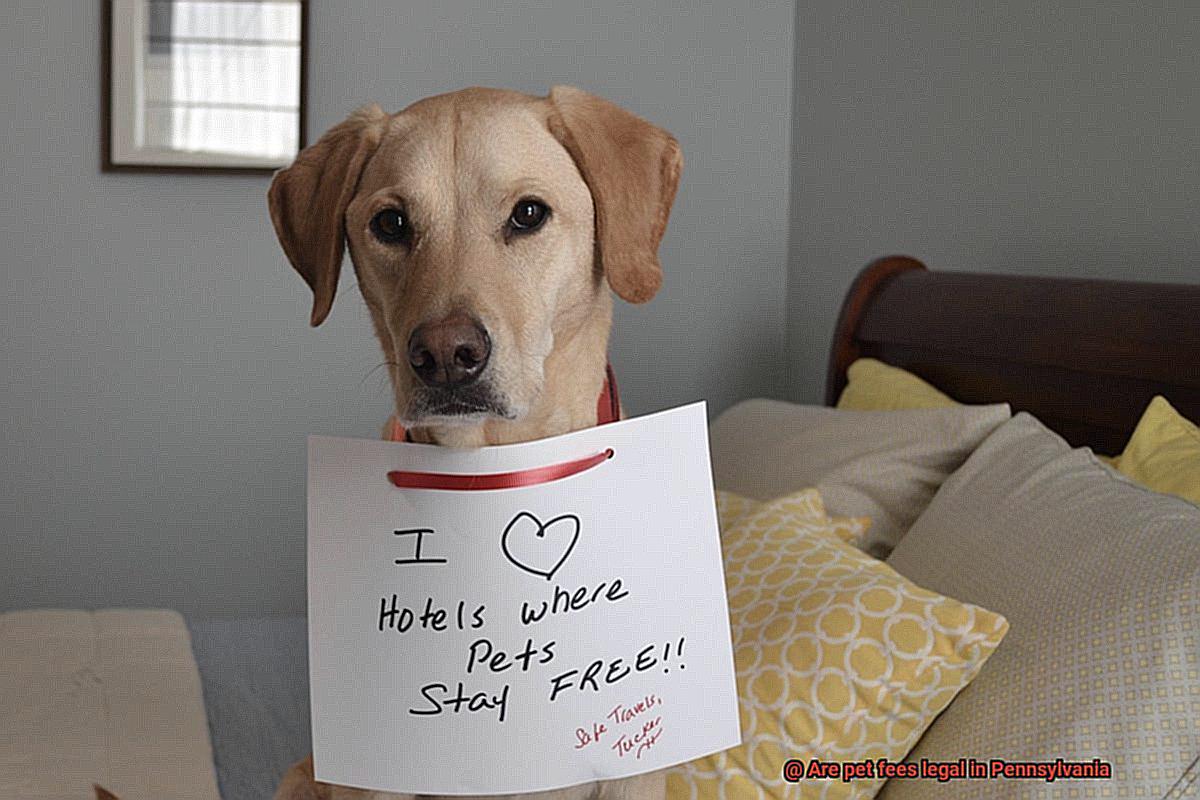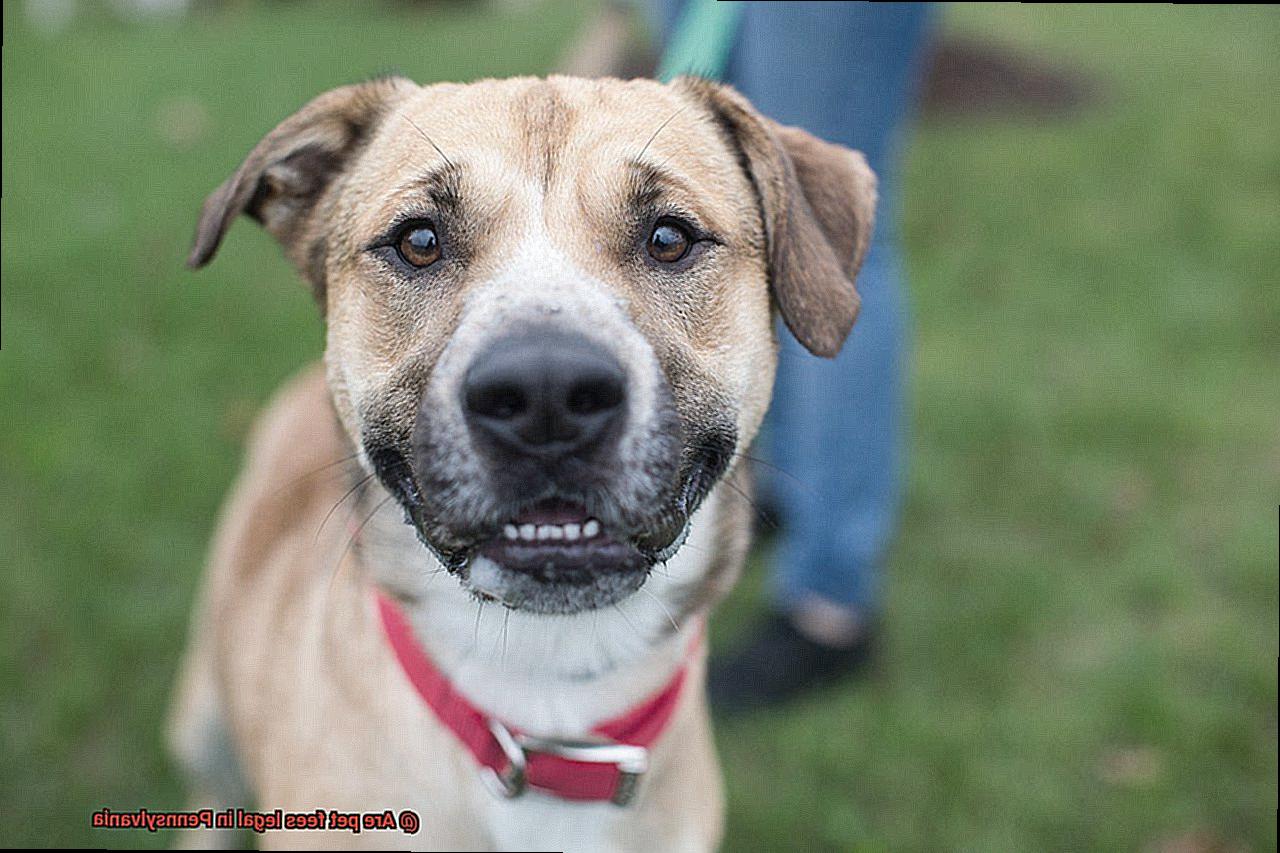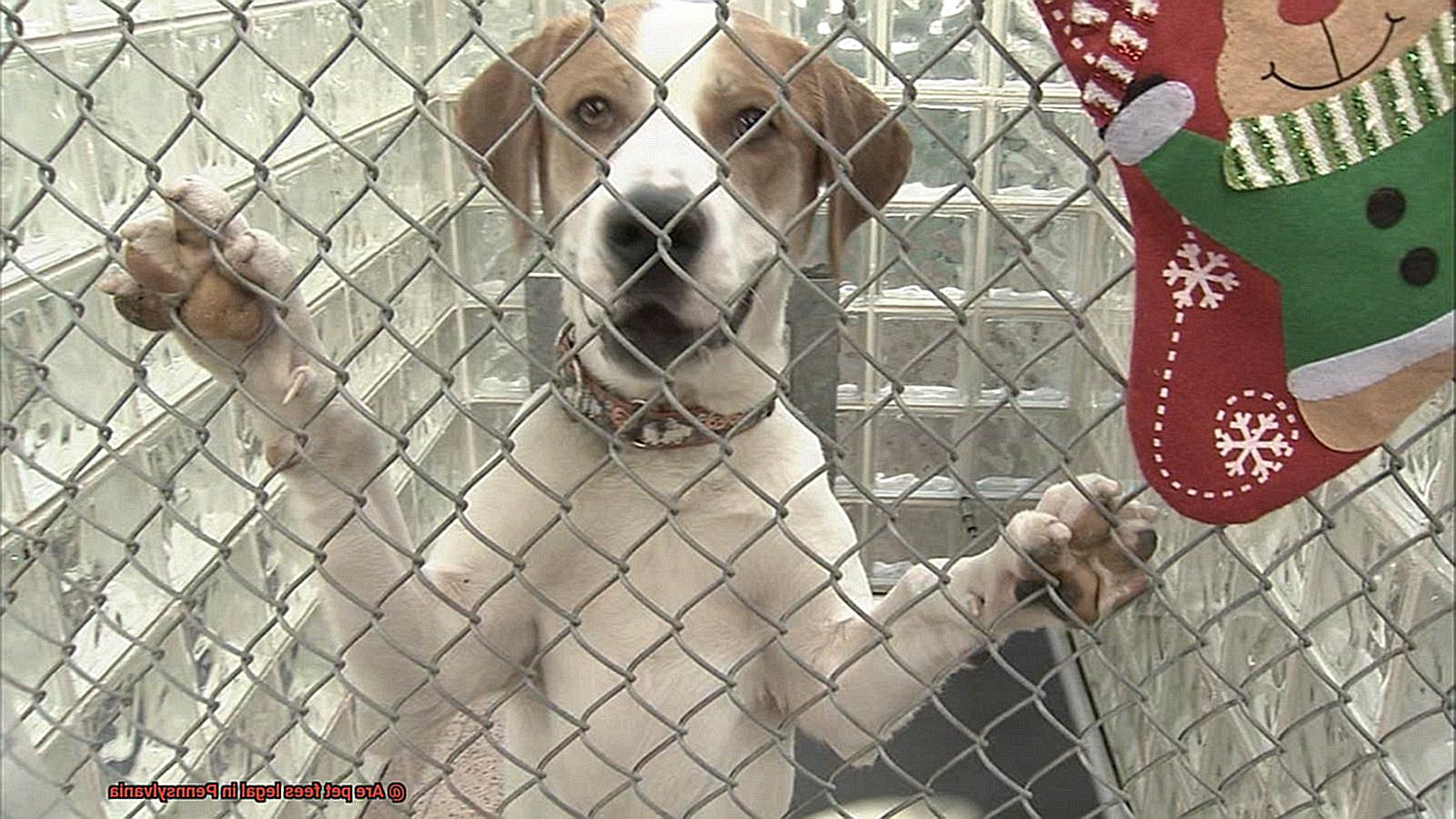Are you a proud pet parent who’s on the lookout for a new home in Pennsylvania? Well, before you start packing your bags and moving into your dream apartment, there’s something you need to know about – pet fees. Yes, that’s right. Some landlords in Pennsylvania charge an extra fee for pets, leaving renters wondering if it’s even legal.
Pet fees can range from a couple of hundred dollars to over a grand per year. And while some landlords justify this fee as covering potential damages caused by pets, others argue that it’s nothing but discrimination against pet owners.

So, let’s get down to business – are pet fees legal in Pennsylvania? The answer is not so straightforward. While landlords are allowed to charge additional fees for pets under Pennsylvania law, they must follow certain guidelines and restrictions. They cannot use these fees as a way to make extra profit or discriminate against tenants with pets.
As a responsible pet owner looking for a rental property in Pennsylvania, it’s crucial to understand the law surrounding pet fees. In this blog post, we’ll take a closer look at the legalities of pet fees in Pennsylvania and give you all the information you need as a prospective renter. Don’t let hidden costs dampen your excitement of finding your perfect home.
Overview of Pennsylvania Landlord and Tenant Act
The Pennsylvania Landlord and Tenant Act of 1951 is the primary law that governs the relationship between landlords and tenants in the state. This act outlines the rights and obligations of landlords and tenants, including issues such as rent increases, evictions, security deposits, and pet policies.
Under this act, landlords in Pennsylvania can charge a pet fee or pet deposit to tenants who wish to keep pets in their rental units. These fees can help cover any damage that a pet may cause to the property or furnishings. However, it’s important to note that pet fees are not specifically addressed in the act. Instead, they fall under the broader category of security deposits.
Landlords must be transparent about their pet policies and fees before tenants move in. This includes outlining any additional deposit or fee required for pets, as well as any restrictions on types or breeds of pets. They should also provide tenants with a written lease agreement that clearly outlines all pet-related fees or restrictions.
It’s crucial for landlords to set reasonable rules and regulations regarding pets and avoid discrimination against certain types of pets or breeds. They cannot use pet fees as a way to discriminate against tenants with disabilities who require service animals.
In addition to pet policies, landlords may also require a security deposit from tenants when they move in. This deposit is meant to protect the landlord against any damage that a tenant may cause to the property. If a tenant has a pet, the landlord may require an additional deposit or fee to cover any potential damage caused by the pet.
To ensure a smooth landlord-tenant relationship, it’s important for both parties to understand their rights and responsibilities in regards to pet policies and security deposits. By following these guidelines and being transparent about all fees and restrictions related to pets, landlords can foster positive relationships with their tenants while protecting their property.
Are Pet Fees Legal in Pennsylvania?
To begin with, it’s worth noting that pet fees are legal in Pennsylvania. Landlords have the right to charge them, but they must be reasonable and not excessive. Pet fees fall under the category of security deposits, which means that landlords can charge a security deposit that cannot exceed two months’ rent. This deposit is refundable at the end of the lease term if there are no damages or unpaid rent. Pet fees are charged in addition to the security deposit and are non-refundable. They can be used to cover any pet-related damages or cleaning costs.
It’s crucial for landlords to set reasonable pet fee policies and disclose them in writing before tenants sign the lease agreement. This allows tenants to make an informed decision about whether or not they can afford to keep a pet in the rental property. The amount of the pet fee is generally left up to the landlord’s discretion, but it must be reasonable.

Tenants also have responsibilities in this area. It’s important for them to be aware of the difference between pet fees and security deposits and make sure they understand what they are being charged for.
To avoid any confusion or disputes with tenants, landlords should be transparent about their pet fee policies. This includes clearly stating what the pet fee covers and how much it is.
Guidelines for Charging Pet Fees
As an expert in this area, I have gathered important information to help you navigate this topic.
Firstly, it’s crucial to understand that pet fees are legal in Pennsylvania, but they must adhere to certain guidelines. Specifically, pet fees are considered a form of security deposit, which means they are subject to the same rules and regulations as other security deposits.
What does this mean for you as a landlord? Firstly, there is a limit to how much you can charge for a pet fee. Under Pennsylvania law, landlords can charge tenants a maximum of two months’ rent as a security deposit. However, if your tenant has a pet, you can add an additional half-month’s rent to cover any damages or extra cleaning required due to the presence of the pet.
It’s important to note that this additional fee cannot be charged on top of the security deposit – it must be included as part of the total amount. For instance, if you charge a two-month security deposit plus an additional half-month’s rent for a pet, the total security deposit cannot exceed two and a half months’ rent.

Another crucial consideration when it comes to charging pet fees is that landlords cannot deduct from the security deposit for regular wear and tear caused by pets. This implies that if your tenant’s cat scratches up the carpet over time, this would be considered normal wear and tear and cannot be deducted from the security deposit – even if there is a pet fee.
To ensure that you follow all of the guidelines for charging pet fees in Pennsylvania, it’s essential to be transparent with your tenants. This means clearly outlining any pet-related fees in the lease agreement and providing detailed documentation of any deductions made from the security deposit.
In summary, here are some key takeaways when it comes to charging pet fees in Pennsylvania:
Outlining Pet Policies in the Lease Agreement
Don’t let the pet policies outlined in a lease agreement catch you off guard. As an expert in this field, I’m here to guide you through the ins and outs of pet policies in rental agreements.
First and foremost, it’s important to understand that there is no statewide law in Pennsylvania that specifically addresses pet fees or deposits. However, landlords have the right to set their own policies regarding pets within their rental properties. This means that they can require a pet fee or deposit as long as it is clearly outlined in the lease agreement.
If you’re a landlord developing your pet policy, consider including the following sub-topics:
Allowing pets: Clearly state whether or not pets are allowed at all within the rental property.
- Permitted pets: Specify any restrictions on pet size, breed, or number of pets allowed. Be sure to consider potential damage to the property and noise complaints from neighbors.
- Fees or deposits: If you require a pet fee or deposit, make sure it is reasonable and not excessive. Remember, pet fees cannot be used to generate additional income.
- Receipts: Provide a written receipt for any pet fees or deposits paid by tenants. This protects both parties and ensures transparency.
As a tenant, thoroughly review the pet policies outlined in the lease agreement before signing. If you have any questions or concerns, address them with your landlord before agreeing to the terms of the lease.
In summary, landlords have the right to set their own policies within their rental properties regarding pets. When outlining pet policies in the lease agreement, it’s crucial to clearly state whether pets are allowed, any restrictions on type or number of pets allowed, and any required fees or deposits. Tenants should carefully review these policies before signing the lease agreement to ensure a successful rental experience for all parties involved.
Accommodating Service Animals Without Additional Fees
As a landlord in Pennsylvania, it’s crucial to understand your obligations when it comes to accommodating service animals. The Americans with Disabilities Act (ADA) requires landlords to provide reasonable accommodations to individuals with disabilities, including allowing them to have their service animals with them in housing accommodations without charging additional fees or deposits.
Service animals are not pets, but rather dogs or miniature horses that have been trained to perform specific tasks for individuals with disabilities. These tasks can include guiding those who are blind, alerting individuals who are deaf, pulling wheelchairs, or providing assistance during seizures. Service animals are essential for their owners’ well-being, and it’s important to recognize the legal protections that they have under the ADA.
While landlords cannot charge extra fees or deposits for service animals, they can still enforce rules and regulations regarding pet behavior and cleanliness. Tenants with service animals are responsible for any damages caused by their animal beyond normal wear and tear.
It’s important to note that emotional support animals (ESAs) are not the same as service animals and do not have the same legal protections under the ADA. Landlords in Pennsylvania are not required to accommodate ESAs without additional fees or deposits, but some may choose to do so as a reasonable accommodation under the Fair Housing Act.
Understanding Your Rights and Responsibilities as a Tenant with Pets
It is imperative to be aware of your rights and responsibilities as a tenant with pets. Although there are no specific laws in Pennsylvania regarding pet fees, there are guidelines that landlords must follow to ensure a fair and safe environment for all tenants.
Your Rights:
- Under the Fair Housing Act, landlords cannot discriminate against tenants with pets. This means that they cannot deny renting to someone solely because they have a pet.
- Landlords cannot charge tenants with pets higher fees or deposits than those without pets.
- If your pet is a service animal, they are not considered a pet, and you cannot be charged extra fees or deposits.
Your Responsibilities:
- As a tenant with pets, it is your responsibility to ensure that your pet does not cause damage to the rental property.
- You must keep your pet under control and clean up after them.
- If your pet causes any damage, you may be held responsible for repairing it or have part or all of your pet deposit withheld.
To ensure a harmonious living situation with your furry friend, it is important to establish open communication with your landlord. Before signing the lease agreement, discuss any pet-related concerns or questions you may have with your landlord. Additionally, make sure to include any agreements regarding pets in the lease agreement.

Potential Penalties for Violating Pet Fee Laws

While landlords are allowed to charge these fees, they must comply with specific state laws. Failure to do so can result in penalties that can have serious consequences.
One of the key regulations of pet fees in Pennsylvania is that landlords cannot charge non-refundable fees for pets without a specific purpose, such as cleaning or repairing damages caused by the pet. If a landlord violates this law, they may face legal action.
So what are the potential penalties for violating pet fee laws? Landlords who charge illegal fees may face fines and even revocation of their rental license. These penalties can have significant impacts on landlords’ livelihoods, making it essential for them to ensure that any fees they charge are in compliance with state laws.

Tenants also play a vital role in ensuring that landlords follow pet fee laws. If they suspect that their landlord is charging illegal fees, tenants should document the fees and take action by contacting the Pennsylvania Attorney General’s Office or taking legal action against their landlord.
In summary, while pet fees are legal in Pennsylvania, it’s crucial for landlords to follow specific laws when charging these fees. Violating these laws can lead to severe penalties that can impact landlords’ lives. As a tenant with a furry companion, it’s important to understand your rights and take action if you suspect that your landlord is charging illegal fees. By working together and adhering to state regulations, we can create a fair and safe environment for all tenants and their pets.

Some tips for tenants to ensure they’re not being charged illegal fees include:
Tips for Avoiding Unlawful Pet Fees

Landlords are permitted to charge pet fees, but these fees must follow certain guidelines and restrictions. Here are some tips on how to avoid these fees and protect your tenant rights.
Understand Your Rights
As a tenant in Pennsylvania, you have certain rights when it comes to pet fees. It is essential to understand these rights so that you can identify any unlawful fees that may be charged. For instance, landlords cannot discriminate against certain types of pets or breeds, and the fee must be reasonable.
Review Your Lease Agreement
Before signing a lease agreement, carefully review it for any mention of pet-related fees or deposits. The lease should clearly state the amount of the fee, whether it is one-time or recurring, and what it covers. If the fee is not clearly stated in the lease agreement, it may not be legally enforceable.
Negotiate with Landlords
Tenants with well-behaved and trained pets can negotiate with landlords to waive or reduce pet fees. Landlords may be more willing to waive fees for tenants who have a good rental history and pets that are well-behaved.
Document the Condition of the Rental Unit
To prevent false claims of damage caused by your pet, document the condition of the rental unit before moving in with your furry friend. Take photos or videos of any pre-existing damages or wear and tear, and provide this evidence to your landlord.
Seek Legal Assistance
If you believe you have been charged an unlawful pet fee, seek legal assistance from an attorney or local housing authority. The Pennsylvania Human Relations Act prohibits discrimination against tenants with pets, and landlords who violate this law can face penalties and fines.
yhu-rYUrwG4″ >
Conclusion
In Pennsylvania, pet fees are legal as long as landlords adhere to specific guidelines and restrictions. The Pennsylvania Landlord and Tenant Act of 1951 is the law that outlines the rights and obligations of landlords and tenants concerning pet policies and security deposits.
To keep pets in their rental units, tenants must pay a pet fee or deposit. However, landlords must be transparent about their policies before tenants move in. They cannot use these fees to discriminate against certain types of pets or breeds.
Tenants also have responsibilities when it comes to pet-related fees. They must understand the difference between pet fees and security deposits. Additionally, they need to ensure that their furry friends do not cause damage to the rental property.
Before signing a lease agreement, both landlords and tenants should establish open communication regarding pet policies. Landlords should clearly outline any pet-related fees or restrictions in writing, while tenants should carefully review these policies before agreeing to the terms of the lease.
Violating pet fee laws can result in penalties for landlords such as fines and revocation of their rental license. Tenants can protect their rights by understanding state law, reviewing their lease agreement for any mention of unlawful fees, negotiating with landlords, documenting the condition of the rental unit before moving in with a pet, and seeking legal assistance if necessary.

